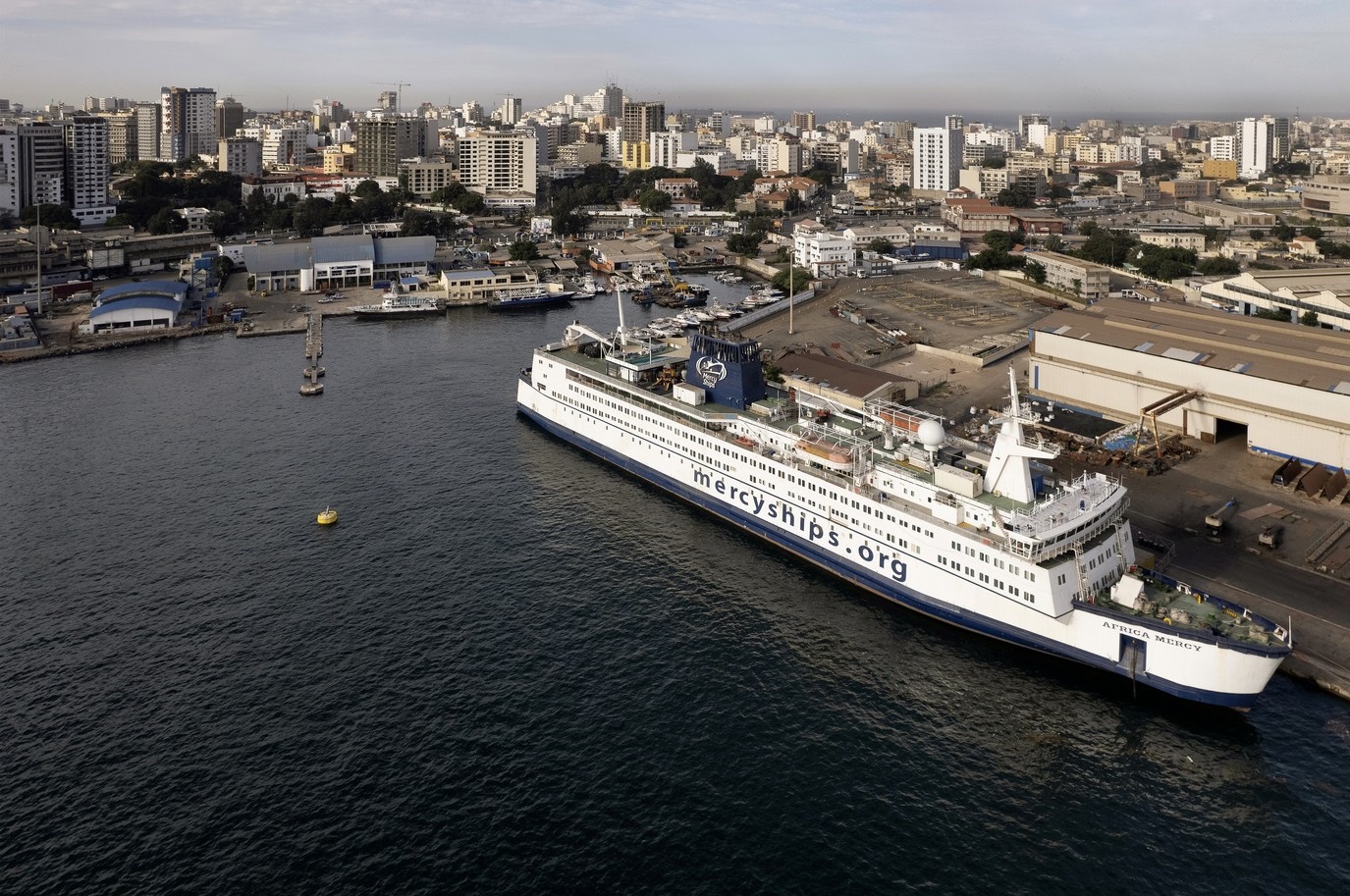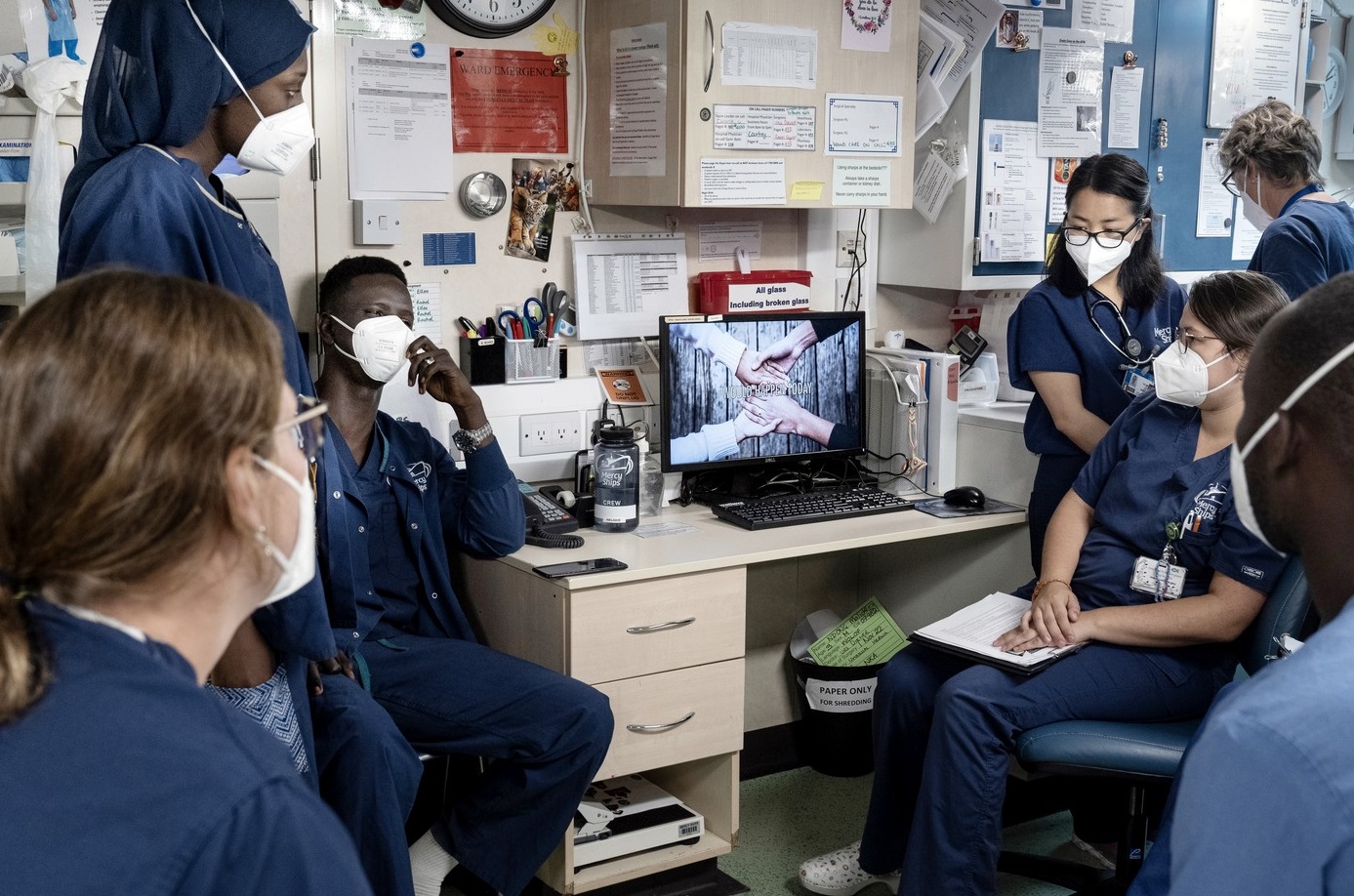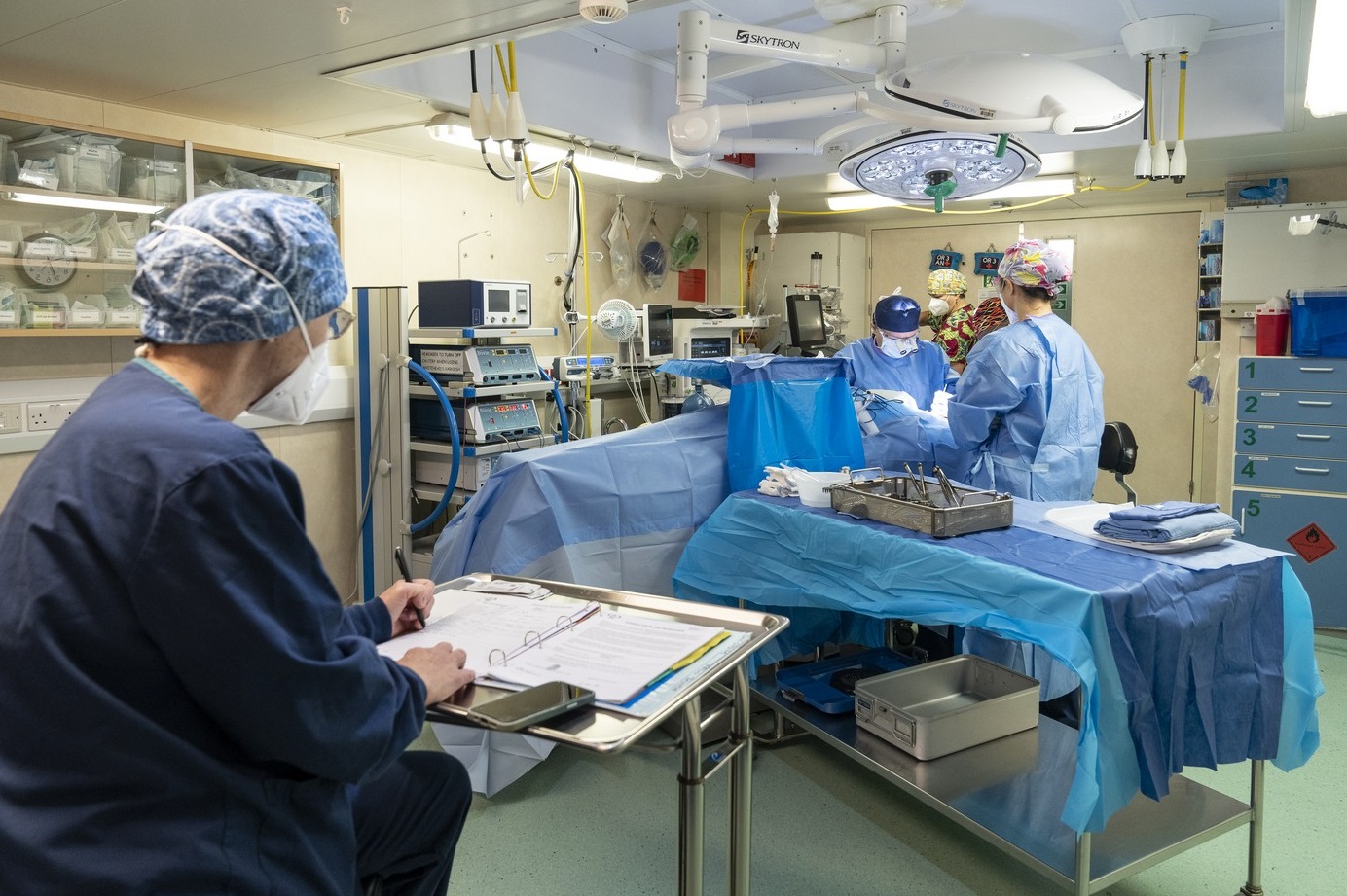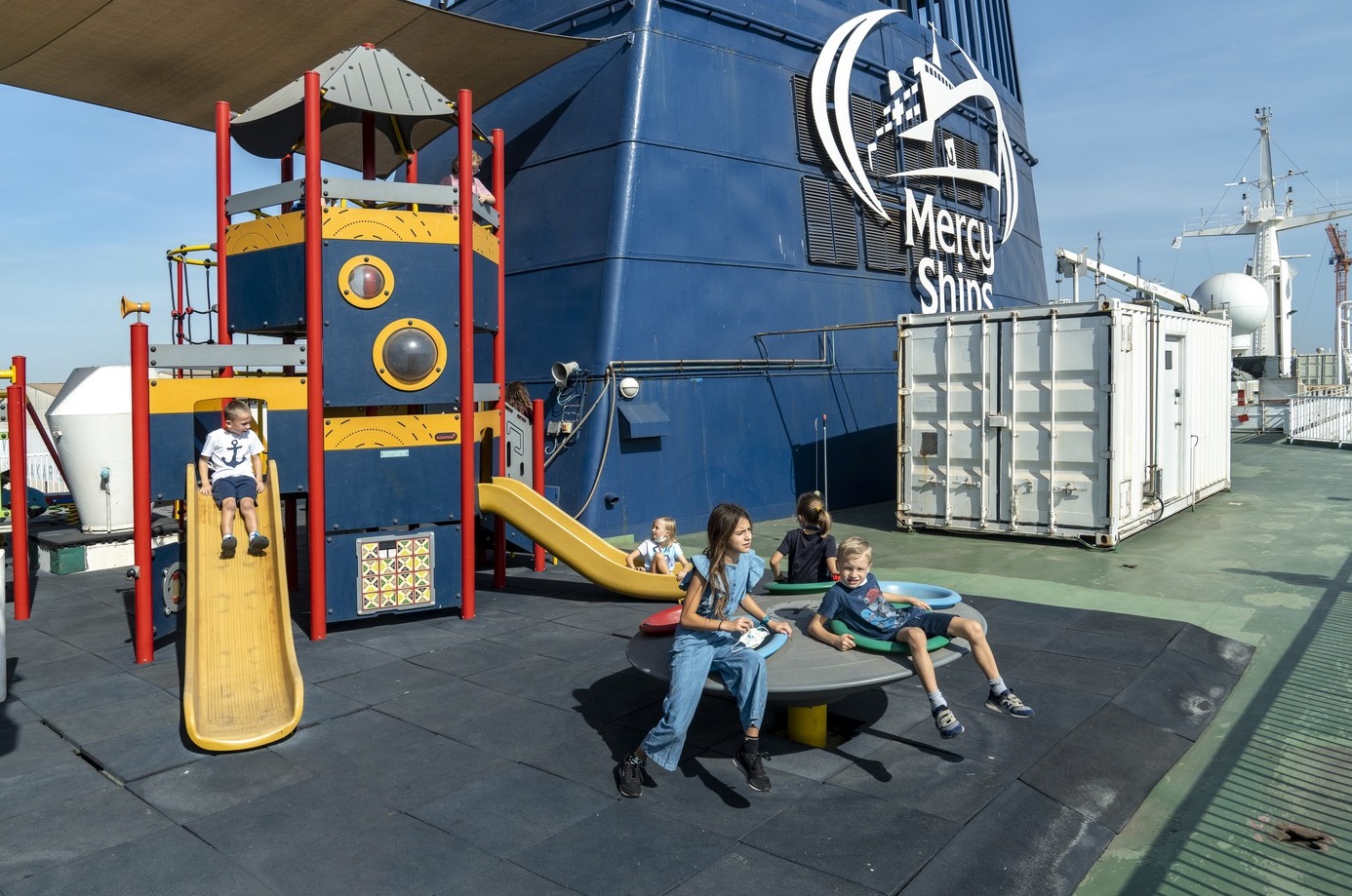Mercy Ships: Floating Hospital Villages
Text and photos by Franck Renoir
Abridged by Syharn Shen (沈思含)
Mercy Ships: Floating Hospital Villages
Text and photos by Franck Renoir
Abridged by Syharn Shen (沈思含)

The Africa Mercy ship was acquired with a donation from the Balcraig Foundation and refurbished with donations from the Oak Foundation and others.
On the morning of November 7, 2022, as I approach the Africa Mercy moored in Dakar, Senegal, the white 152m-long, 24m-wide ship comes into view. It's one of the hospital ships run by the international NGO Mercy Ships, which provides medical care to people in need across Africa. Formerly a ferry transporting wagons in Denmark, the 45-year-old ship was acquired in 1999, renamed in 2000, and operational in 2007. It's the fourth of five in the NGO's fleet, but only it and the new Global Mercy Ship are operational.
Mark, the head of communications, greets me and shares the story of Don and Deyon Stephens, the visionary Christian couple who founded Mercy Ships in 1978. The idea came to Don in the 1970s when he was 19 years old. He was in the Bahamas with a group of young Christians when Hurricane Cleo devastated the area. The group caught in the hurricane took refuge in an old shed where Don heard a prayer or call that he now considers to be divine: "Wouldn't it be wonderful if a ship could come in after this devastation to provide the necessary medical care and supplies?" The voice spoke to him. A few years later, while working on a research, Don realized that 95 of the 100 largest cities in the world were port cities, making a hospital ship an effective way to provide healthcare to a large number of people. Today, Mercy Ships has helped millions of the world's poorest people (2.86 million to date), with campaigns determined by requests from host countries.
Equipped with cabins mainly consisting of bunk beds and some the size of a small flat reserved for families, a restaurant where 28,000 meals have been served in ten months, and a cafeteria that is a common place for people to rest, play, take lessons, and drink coffee, the Africa Mercy hosts 350 to 450 volunteers from over 60 different countries. Among the volunteers, who pay 200 Euros per month for their accommodation and meals, there are medical professionals, sailors, mechanics, technicians, engineers, teachers, cooks, and more. Their children are taken care of by the school onboard. The ship also employs 150 local people, who mostly serve as translators or drivers. The common language here is English.

Medical professionals gather for Worship Wednesday in B ward with a spiritual video playing.
Very different from a traditional hospital, the ship's atmosphere is more like a small floating village with a rich and warm community that includes five surgical rooms, 20 medical beds, a laboratory, a scanner, a radio service, and three pharmacies stocked with donated medicine.
I watch the night shift change over to the day shift as volunteers pray together in front of a spiritual video before either going to sleep or going on duty. In the patient area at the lower level of the hospital, I see nurses and young patients playing together. Here, people are tested and checked by doctors before they are prepared for operations. Coumba, a young lady from northern Senegal has received plastic surgery for the burns on her arm sustained 25 years ago, when she saved her brother from a fire. I was moved to see Marianne, a Dutch nurse, provide wound care while bringing joy to her patient by singing and dancing. If access to surgery were easier, patients would not have to wait so many years to undergo surgery, and "this is one of the reasons why Mercy Ships is necessary," Mark says.

Kathleen Haydon, an operating room nurse from the United States, takes notes during the maxillofacial surgery of a young patient.
Dr. Gary, who is best known in the hospital for his medical experience and for having lived on board Mercy Ships for more than 35 years, tells me: "I have been working in developing countries for a long time and I often see people who seem to be waiting in a corner, without giving the impression that they are going to do something to get out of their situation. But the reason for this is not that they are lazy or lack intelligence. On the contrary, it is because they lack hope. When people come to us on board, they see the impossible happen, and there is hope for the future!" Dr. Gary sums up with his favorite quote: "For hope to be credible in the future, it must be tangible in the present."
The ship provides the patients and crew with everything they need to feel good and to regain their morale and physical fitness. On the bridge, there is a certain “joie de vivre” and hope as patients and volunteers enjoy time playing games and exercising. Nurses dance and sing to bring joy to their patients and also encourage them to join along. Nine-year-old Djby, who received an operation for a cleft palate, likes to race and has asked a nurse to play with him. His mother tells me: "The people on board the ship takes care of my son and me. I feel so grateful to be here that I don't want to leave. But now, Djby will have the courage to reach out to others. In fact, his life will change."

During break, children from the primary school come to play on the open deck playground on the 8th level. Custom built for children, the playground was donated by a Christian foundation.
In a safety exercise, I meet the captain, Captain Richard, who confided to me: "My life is the sea, but my primary objective is to serve the underprivileged so that they can benefit from aid that can transform their lives." The captain's main focus at the dock is to oversee safety and security while engineers make sure the ship's operations run smoothly, providing water, electricity and ventilation.
On a visit to the operation rooms, I discover that there is absolutely everything necessary to perform surgeries over the ten months of the mission. Since February 2022, over 200 volunteer surgeons, anesthetists, specialist nurses, biomedical technicians, and other medical professionals from 23 countries have come to Senegal to provide free surgery. Since its inception, Mercy Ships has performed over 108,000 transformative surgeries and more than 521,000 dental procedures.
As the sun is about to set and the day comes to an end, volunteers enjoy playing football on the quay in front of the ship. My time on the Africa Mercy leaves me with an optimistic view of human nature, having seen a community of volunteers and locals working together to provide essential healthcare to those in need.
Contact Us | Plan a Visit | Donate
8 Lide Road, Beitou 11259, Taipei, Taiwan
886-2-2898-9999
005741@daaitv.com
©Tzu Chi Culture and Communication Foundation
All rights reserved.
